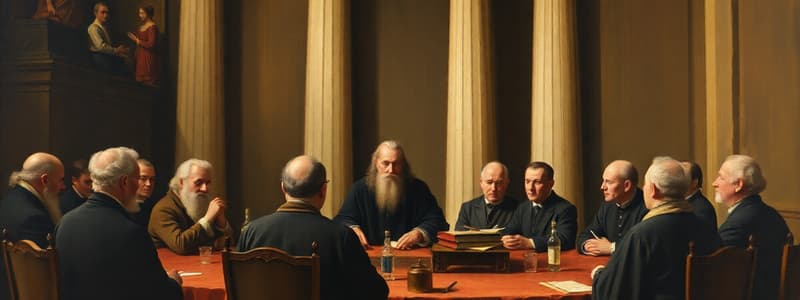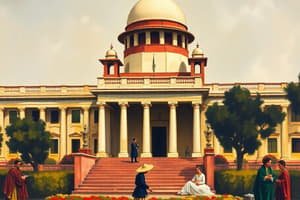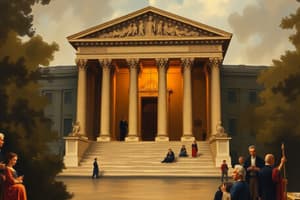Podcast
Questions and Answers
What is the primary role of the judiciary in the U.S. government?
What is the primary role of the judiciary in the U.S. government?
Which case established the principle of judicial review?
Which case established the principle of judicial review?
What significant change did the Eleventh Amendment introduce regarding state sovereignty?
What significant change did the Eleventh Amendment introduce regarding state sovereignty?
Who was the chief justice credited with defining the modern role of the Supreme Court?
Who was the chief justice credited with defining the modern role of the Supreme Court?
In the structure of the federal judicial system, which courts are directly below the Supreme Court?
In the structure of the federal judicial system, which courts are directly below the Supreme Court?
What key power was established by the Supreme Court in Marbury v. Madison?
What key power was established by the Supreme Court in Marbury v. Madison?
What was the outcome of Marbury v. Madison concerning William Marbury's commission?
What was the outcome of Marbury v. Madison concerning William Marbury's commission?
How does the common law system in the United States differ from code law systems?
How does the common law system in the United States differ from code law systems?
What was the outcome of the National Federation of Independent Business v. Sebelius case regarding the ACA?
What was the outcome of the National Federation of Independent Business v. Sebelius case regarding the ACA?
In Burwell v. Hobby Lobby, what aspect of the ACA was addressed by the Supreme Court?
In Burwell v. Hobby Lobby, what aspect of the ACA was addressed by the Supreme Court?
What was the Supreme Court's ruling in the case involving Samantha Elauf and Abercrombie & Fitch?
What was the Supreme Court's ruling in the case involving Samantha Elauf and Abercrombie & Fitch?
How does the Supreme Court influence interpretations of the Constitution?
How does the Supreme Court influence interpretations of the Constitution?
What is the primary method by which the Supreme Court enforces individual rights?
What is the primary method by which the Supreme Court enforces individual rights?
Which of the following was a significant outcome of Brown v. Board of Education?
Which of the following was a significant outcome of Brown v. Board of Education?
What does judicial review allow the courts to do?
What does judicial review allow the courts to do?
What is the primary role of the Supreme Court according to the U.S. Constitution?
What is the primary role of the Supreme Court according to the U.S. Constitution?
What did Alexander Hamilton argue about the federal judiciary in Federalist No. 78?
What did Alexander Hamilton argue about the federal judiciary in Federalist No. 78?
Which of the following best describes the concept of appellate jurisdiction?
Which of the following best describes the concept of appellate jurisdiction?
Under what circumstances does the Supreme Court exercise original jurisdiction?
Under what circumstances does the Supreme Court exercise original jurisdiction?
Which of the following best reflects the relationship between the courts and justice, according to Hamilton?
Which of the following best reflects the relationship between the courts and justice, according to Hamilton?
Which type of law primarily deals with disputes involving harm or injury between private parties?
Which type of law primarily deals with disputes involving harm or injury between private parties?
Under which circumstance would a case likely fall under federal jurisdiction?
Under which circumstance would a case likely fall under federal jurisdiction?
What percentage of all cases in the U.S. court system are typically heard at the state level?
What percentage of all cases in the U.S. court system are typically heard at the state level?
Which of the following is a characteristic of federal courts?
Which of the following is a characteristic of federal courts?
In which case would the federal courts intervene if the matter started in state courts?
In which case would the federal courts intervene if the matter started in state courts?
What is the primary role of the U.S. Supreme Court in the dual court system?
What is the primary role of the U.S. Supreme Court in the dual court system?
Which Supreme Court case established that women have a constitutional right to abortion?
Which Supreme Court case established that women have a constitutional right to abortion?
What determines whether cases from state courts can reach the U.S. Supreme Court?
What determines whether cases from state courts can reach the U.S. Supreme Court?
Which statement accurately reflects the dual court system?
Which statement accurately reflects the dual court system?
What did the Supreme Court rule regarding the use of midazolam in lethal injections?
What did the Supreme Court rule regarding the use of midazolam in lethal injections?
What was the result of Ernesto Miranda's retrial in state court?
What was the result of Ernesto Miranda's retrial in state court?
What does the dual court system provide to individuals?
What does the dual court system provide to individuals?
What issue exemplifies the challenges posed by differing state laws?
What issue exemplifies the challenges posed by differing state laws?
Why were Nebraska and Oklahoma concerned about Colorado's marijuana laws?
Why were Nebraska and Oklahoma concerned about Colorado's marijuana laws?
What was one critical outcome of the Supreme Court's ruling for Miranda?
What was one critical outcome of the Supreme Court's ruling for Miranda?
How does the selection method of judges at the state level potentially influence court rulings?
How does the selection method of judges at the state level potentially influence court rulings?
What is one consequence of the decentralized court systems across different states?
What is one consequence of the decentralized court systems across different states?
What role does precedent play in the operations of federal courts?
What role does precedent play in the operations of federal courts?
How many U.S. district courts are there in the national system?
How many U.S. district courts are there in the national system?
What is the key function of circuit courts within the federal judicial system?
What is the key function of circuit courts within the federal judicial system?
Flashcards
Court Jurisdiction
Court Jurisdiction
The authority of a court to hear cases and make decisions about them.
Original Jurisdiction
Original Jurisdiction
A case heard for the first time in a court.
Appellate Jurisdiction
Appellate Jurisdiction
A case heard on appeal from a lower court, where the higher court can change the lower court's decision.
Judicial Review
Judicial Review
Signup and view all the flashcards
Separation of Powers
Separation of Powers
Signup and view all the flashcards
Marbury v. Madison
Marbury v. Madison
Signup and view all the flashcards
District Courts
District Courts
Signup and view all the flashcards
Circuit Courts (Courts of Appeals)
Circuit Courts (Courts of Appeals)
Signup and view all the flashcards
Supreme Court
Supreme Court
Signup and view all the flashcards
Judicial Fine-Tuning
Judicial Fine-Tuning
Signup and view all the flashcards
Marbury v. Madison (1803)
Marbury v. Madison (1803)
Signup and view all the flashcards
Common Law
Common Law
Signup and view all the flashcards
Judicial Policymaking
Judicial Policymaking
Signup and view all the flashcards
The Affordable Care Act (ACA)
The Affordable Care Act (ACA)
Signup and view all the flashcards
Individual Right to Handgun Ownership
Individual Right to Handgun Ownership
Signup and view all the flashcards
Miranda Rights
Miranda Rights
Signup and view all the flashcards
Right to Abortion
Right to Abortion
Signup and view all the flashcards
Same-Sex Marriage
Same-Sex Marriage
Signup and view all the flashcards
Dual Court System
Dual Court System
Signup and view all the flashcards
Civil Law Cases
Civil Law Cases
Signup and view all the flashcards
Criminal Law Cases
Criminal Law Cases
Signup and view all the flashcards
Jurisdiction
Jurisdiction
Signup and view all the flashcards
Federal Court Jurisdiction
Federal Court Jurisdiction
Signup and view all the flashcards
Supremacy Clause
Supremacy Clause
Signup and view all the flashcards
Jurisdictional Variance
Jurisdictional Variance
Signup and view all the flashcards
Marijuana as a Schedule 1 Drug
Marijuana as a Schedule 1 Drug
Signup and view all the flashcards
Precedent
Precedent
Signup and view all the flashcards
Courts of Appeals (Circuit Courts)
Courts of Appeals (Circuit Courts)
Signup and view all the flashcards



